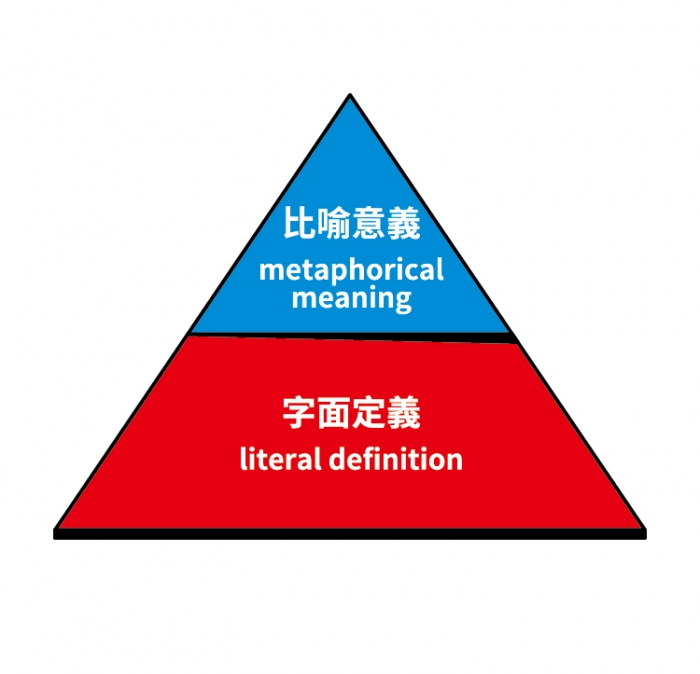
機器翻譯不出來的單字隱喻
文/Jack Chu
硬背單字是一個快速又有效的方式,但是在學習高階字彙時,這樣的方法似乎不管用。深入掌握字義與隱喻之間的關聯,幫助你在記憶單字時,背一次就能聯想到N種解釋。
英語世界裡,單字稱王
In English, words are king!
As an ESL (English as Second Language) learner, you definitely know that learning English vocabulary words is essential for achieving English fluency.
How do you normally study and pick up new vocabulary words?
Most English students, including native speakers, use rote memorization to acquire new vocabulary words. While this method is necessary, useful, and effective, it is not sufficient for learning higher level vocabulary words. To develop a deeper understanding and mastery of English words, you need to know the difference between the literal definition and the metaphorical meaning of a word.
每一個字都有金字塔結構
In English, every word is like a container. It can hold two types of definition. The first type is called the literal definition (LD). The second type is called the figurative meaning (FM), which is more commonly known as the metaphorical meaning (MM).
Before we move on, let’s define these key terms:
• The literal definition of a word is the most basic meaning of the word.
• The figurative meaning or the metaphorical meaning of a word extends its literal definition to create a more abstract or imaginative meaning of the word.
To help you visualize the relationship between LD and FM or MM, it is useful to depict these two types of definition with a two-level pyramid. The literal definition is at the base of the pyramid. The metaphorical meaning is at the top of the pyramid because it is an extension of the literal definition.
This pyramid gives rise to two useful distinctions. Since the literal definition represents the base or the foundation of the pyramid, I call this the first-level definition (or level 1 definition). Because the metaphorical meaning sits at the top of the pyramid, I call this the second-level definition (or level 2 definition).
看看以下單字的兩層意義
To give you a better idea of these two concepts, let’s examine three examples.
·literal definition
·metaphorical meaning
①
First, let’s take a look at the phrase to strike a deal.
Strike (v.)
LD:to hit or to attack something
MM:to find, to come to, to come upon, or to come across
Where does this metaphorical meaning come from?
What is the connection between the literal sense of strike (as in to hit or to attack) and the figurative or metaphorical sense of strike (as in to find, to come to, to come upon, or to come across)?
Here we need to close our eyes and place ourselves back in the olden days of mining.
In the past, when miners dug for precious minerals such as gold, they would use tools such as a hammer to strike or hit the rocks until they found or came across the precious minerals that they were looking for.
So the metaphorical sense of the phrase to strike _____(something valuable) means to find, to come to, to come across, to come upon ____ (something of high value). This is a shorter way of saying to find a way to get or to gain _____ (something precious).This is why the phrase to strike a deal means to come to an agreement, not to hit or attack an agreement.
Second, let’s study the words labyrinthine and circuitous.
These two words are very similar. The word labyrinthine is an adjective that contains the noun labyrinth. Similarly, the word circuitous is an adjective that contains the noun circuit.
Labyrinthine (adj.)
LD:like a labyrinth
MM:complex or complicated
Why? Because a labyrinth is a structure with an intricate network of passages. In other words, it is a very, very complicated maze that is hard to navigate—a place where it is easy to get lost.
Circuitous (adj.)
LD :like a circuit, circular, and roundabout
MM:indirect and not straightforward
Why? Because a circuit is a structure that goes in a circle, in a cycle, or in a circular manner. When something moves in this fashion, it is not traveling in a direct manner, which would be in a straight line.
Finally, let’s analyze the word prescient.
Prescient (adj.)
LD:having foresight,having prior knowledge about what will happen, farsighted, or foresighted
MM:judicious,wise
How are these two types of definition related to each other? What is the connection here? To create the link between these two levels of definition, we need to think in terms of a person.
Let’s use Zhuge Liang (諸葛亮) to help us achieve a deeper comprehension of the word prescient.
As a mastermind, sage, and military genius, Zhuge Liang was prescient. He was a farsighted person because he had the ability to see very far ahead into the future. This also means that he was good at making and carrying out long-range or far-reaching plans. Thus, someone who is prescient like Zhuge Liang is also wise because he or she does not just focus on today. He or she looks and thinks farther ahead into the future.
As these examples illustrate, knowing the difference between LD and MM will take your English to the next level.
So the next time you review an old vocabulary word or come across a new vocabulary word in English, don’t
just try to memorize the definitions of this word. Instead, do your English a favor and practice your new trick by asking yourself the following questions:
- 1. What is the literal definition of this word?
- 2. What is the metaphorical meaning of this word?
- 3. How is the literal definition related to the metaphorical meaning? What is the connection between these two types of definition?
| 加入Line好友 |  |

 擔心生理健康,心理卻出問題?
擔心生理健康,心理卻出問題?